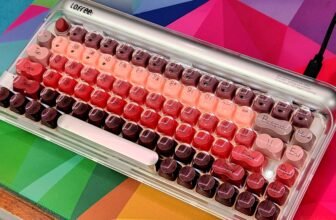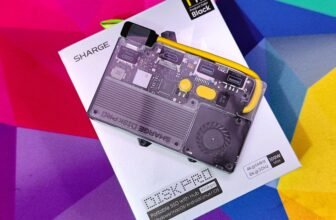Silicon Power XS70 PCIe 4.0 SSD engineered specifically with the demands of high-performance gaming in mind. As the latest addition to Silicon Power’s lineup, the XS70 stands as a direct successor to its predecessor, the PCIe Gen3 XD80 model, boasting a significant performance leap with double the speed. With NVMe 1.4 support pushing speeds up to 7000MB/s, the XS70 emerges as a formidable contender in the realm of high-speed storage solutions.
Sporting the compact M.2280 80 (70mm) form factor, the XS70 packs a punch with its Phison PS5018-E18 controller, alongside updated firmware and cutting-edge Micron B47R 3D NAND TLC memory. This amalgamation of top-tier components ensures blazing-fast performance, making it an ideal choice not only for PC gaming enthusiasts but also for next-gen console users seeking to expand their storage capabilities.
The Silicon Power XS70 delivers impressive sequential read speeds of up to 7.3 GB/s and writes of 6.8 GB/s, promising lightning-fast data transfer rates. Moreover, with features like a dedicated heat spreader designed in the shape of a shark fin, the XS70 prioritizes thermal management, safeguarding against overheating and ensuring consistent performance, especially during extended gaming sessions or resource-intensive tasks. Beyond its sleek design and robust performance, the XS70 incorporates essential features such as DRAM cache buffers, RAID technology, and LDPC encoding, enhancing system stability and data integrity for a seamless gaming experience.
In this review, we’ll delve into the capabilities of the 2TB variant, exploring its performance, reliability, and value proposition in the fiercely competitive SSD market. With a generous 5-year warranty, the Silicon Power XS70 is available in capacities ranging from 1TB to 8TB, priced competitively at approximately $89.99 for the 1TB model, $149.99 for the 2TB model, $289.99 for the 4TB model and $872.99 for the 8TB Model.
Unpackaging
The unpackaging of the M2 SSD reveals a sleek presentation typical of such storage devices. Encased in a cardboard sheet with a transparent window, the product is showcased alongside its pre-installed heatsink, giving it a sophisticated look.






The packaging’s black and gold color scheme complements the SSD’s design, making it visually striking. Prominently displayed on the front are impressive speed specifications of up to 7300 MB/s read and 6800 MB/s write, along with a reassuring 5-year warranty. Turning to the back, additional technical details and manufacturer information, including a QR code for easy registration, ensure a comprehensive understanding of the product’s capabilities and support options.
Closer Look

After unpackaging the Silicon Power XS70 SSD, we were immediately impressed by its sleek design featuring a pre-installed SP brand heatsink that spans the entire surface of the PCB, measuring 22 mm wide and 80 mm long. Clearly labeled as a PCI-E Gen 4 SSD, it signals its high-performance capabilities, hinting at the necessity of a compatible motherboard to fully leverage its potential. The attention to detail in the design not only enhances its aesthetic appeal but also underscores its robust engineering, promising efficient heat dissipation and optimal performance under demanding workloads.

Flipping the SSD over reveals a sturdy metal plate that conceals the internal components, maintaining a clean and minimalist appearance. While it obscures the direct visibility of the electronic elements, a label provides essential details including the model reference and capacity. Although the specifics of the internal components remain hidden, the manufacturer offers insights into its power source, the Phison E18 controller, and the composition of TLC Micron memory chips. For a deeper dive into its technical specifications and performance capabilities, further exploration awaits on the subsequent page.



The XS70 boasts a revolutionary heatsink design inspired by the efficient gills of a shark. Its meticulously angled slots facilitate optimal airflow, ensuring consistent cooling even during marathon gaming sessions. What sets this design apart is its compact size, perfectly tailored to seamlessly integrate into the PlayStation 5 without the need for removal. With dimensions measuring just 24.6 mm x 80.0 mm x 10.8 mm and a featherlight weight of 33 grams, the XS70 offers both performance and convenience. Its ability to effortlessly slot into the PS5 underscores its thoughtful engineering and dedication to enhancing the gaming experience.

The design of the Silicon Power XS70’s heatsink is undeniably stunning, evident in the accompanying photos. The heatsink features a striking metallic gray color with the Xpower logo, indicating its robust capabilities. Additionally, the lower end showcases a PCIe Gen 4×4 label, signifying its high-speed performance. Complementing this, the “shark gills,” sporting a sleek black hue, serve as dissipation lines to effectively regulate temperatures. Ventilation is optimized through these gill-shaped slots on the m.2’s heatsink, ensuring optimal performance by preventing overheating. As formidable as a shark in performance, the XS70 also mimics its namesake’s efficient breathing, enabling extended periods of stable gameplay.
Features
The XS70 SSD introduces a novel double-sided particle design, showcasing innovative engineering in its construction. Inside the box, the prominent main control chip is InnoGrit’s IG5236, crafted using TSMC’s advanced 12nm process. It boasts Micron DRAM MT40A512M16TB-062E:R chips on both its front and back sides, alongside four YMCT SYMN09TC1B1RC6C TLC particles. While the specific components may vary across batches, each iteration promises top-tier performance.
The Phison E18 controller paired with 176-layer Micron TLC NAND stands out as a powerhouse combination in the realm of high-end storage solutions. Micron’s claim of superior performance with a 30% reduction in die size and a 35% improvement in read and write latency over previous generations highlights why many manufacturers opt for this technology. Brands like Silicon Power leverage this controller and NAND combination, a notable shift from their previous use of Phison’s E16 controller. This strategic choice reflects the industry’s recognition of the advancements brought by Micron’s 176-layer TLC NAND.
One of the remarkable features of this storage solution is its ability to effectively manage heat. With the incorporation of the Phison E18 controller and a dedicated heatsink, temperatures can be reduced by up to 40%. Such temperature management not only enhances performance but also contributes to prolonging the product’s lifespan. This attribute is particularly crucial for high-performance devices prone to overheating during intensive use, ensuring consistent performance and reliability over time.
The XS70 storage drive offers an array of features designed to optimize performance and reliability. Utilizing technologies such as LDPC, RAID, and DRAM cache buffer, it ensures accurate data transmission and maintains high array performance even under challenging conditions. Coupled with a PCIe Gen 4×4 interface, robust shock resistance, extensive certifications, and ample storage capacities up to 8TB, the XS70 emerges as a versatile solution suitable for various applications. Notably, its compatibility with the PlayStation 5 console underscores its suitability for gaming enthusiasts seeking expanded storage options without compromising performance or reliability.
Performance
Next, test the performance of the Silicon Power XS70 2TB M.2 SSD, the Build powered by an Intel 12th Generation Core-i7 12700K processor coupled with Silicon Power Xpower Zenith RGB 5200Mhz 32GB DDR5 Memory Kit, with MAXSUN Terminator Z790M D5 WIFI motherboard, supports PCIe 4.0 technology, the overall performance is at the upper-high level, and there should be no bottleneck problem for testing the read and write performance of solid-state drives.

The following configuration is to test the Silicon Power XS70 2TB M.2 SSD performance:
- Motherboard: MAXSUN Terminator Z790M D5 WIFI – (Buy From Amazon)
- CPU: Intel Core i7-12700K – (Buy From Amazon)
- Cooler: Yeston*Zeaginal ZC-Zeus XT360 Liquid CPU Cooler – Review – (Buy From Amazon)
- Memory: Silicon Power Xpower Zenith RGB DDR5 (32GB) – (Buy From Amazon)
- Graphics Card: Predator BiFrost Intel Arc A770 – (Buy From Amazon)
- Storage: TEAMGROUP MP44 1TB M.2 SSD – (Buy From Amazon)
For Benchmark Test: Silicon Power XS70 2TB M.2 SSD – (Buy From Amazon) - Case: HYTE Y40 Modern Aesthetic Case– (Buy From Amazon)
- Power Supply: MONTECH Century 850 (80 PLUS Gold Certified) – (Buy From Amazon)
- OS: Microsoft Windows 10 Pro-64-bit – (Buy From Amazon)
Benchmark Software
To test the performance of SSD, we used some well-established hard drive Benchmark software.
- SP ToolBox
- CrystalDiskInfo
- CrystalDiskMark
- AS SSD Benchmark
- ATTO Disk Benchmark
- Anvil’s Storage
- HD Tune Pro
- TxBENCH
SP ToolBox



The Silicon Power XS70 is enhanced with SP ToolBox support, offering users a comprehensive suite of utilities. This toolbox empowers users with essential functionalities like self-monitoring analysis, wear monitoring, diagnostic scanning, and speed testing for both reading and writing operations. Additionally, it facilitates data clearing and offers various other useful features, making storage management convenient and efficient.
CrystalDiskInfo


The CrystalDiskInfo display boasts support for various advanced functions such as SMART, TRIM, VolatileWriteCache, PCIe Gen4x4, and NVMe 1.4 standards. Performance tests conducted via CrystalDiskMark indicate commendable read and write speeds. Notably, the standby temperature remains at a stable 38 degrees, with a peak of 72 degrees under high-performance loads. To mitigate high temperatures, it’s advisable to employ a bare test rack, particularly in windless environments. Despite this, passive heat dissipation mechanisms, such as heatsink fins, can effectively manage temperatures with even minimal air circulation within the casing.
CrystalDiskMark

The CrystalDiskMark sequential performance test results for this PCIe 4.0 hard drive are impressive, boasting a read speed of 7109.48MB/s and a write speed of 6673.50MB/s. Additionally, the 4k test demonstrates solid performance with read speeds of 76.67MB/s and write speeds of 322MB/s. These figures place it among the top performers in its class. Remarkably, these speeds closely align with the official specifications of 7300MB/s for reading and 6800MB/s for writing, showcasing the reliability and consistency of this drive’s performance.
AS SSD Benchmark

The AS SSD Benchmark software utilizes a meticulous 5GB dataset for its comprehensive read-and-write evaluations. Upon analyzing the test outcomes, it becomes evident that the performance score for this 5GB dataset achieves an impressive 8993 points. Furthermore, the continuous read and write speeds demonstrate remarkable figures, reaching 5317.10MB/s and 5179.52MB/s, respectively.
ATTO Disk Benchmark

When conducting small file reading and writing tests, ATTO Disk Benchmark proves to be an invaluable tool. It reveals impressive figures, showcasing a maximum reading speed of approximately 6.58 GB/s and a maximum writing speed of 6.22 GB/s. These results underscore the efficiency and reliability of the tested system. Moreover, the consistency in performance across various scenarios indicates a stable overall performance, reassuring users of its dependability in handling everyday tasks and demanding workloads alike.
Anvil’s Storage

During the Anvil’s Storage Utilities test, the solid-state drive showcased impressive performance, scoring 22,131.68. This remarkable result highlights its position at the forefront of PCIE 4.0 technology, firmly establishing itself within the first tier of performance. Such high scores underscore the drive’s capability to handle intensive data tasks with speed and efficiency, making it an ideal choice for users seeking top-tier storage solutions for their computing needs.
HD Tune Pro

The HD Tune file benchmark test, when writing 200GB files and employing the strategy of fully simulating SLC (Single-Level Cell), demonstrates remarkable stability in performance. Throughout the test, the actual curve of performance remains steady, with an overall throughput maintained at around 6GB/s. This consistency underscores the efficiency and reliability of the simulated SLC approach in handling large file writes, ensuring consistent and high-speed data transfer rates.
TxBENCH

The TxBENCH test results reveal impressive reading and writing scores of 7074.336 MB/s and 6602.381 MB/s respectively. These figures showcase robust performance, echoing the consistency observed in the CrystalDiskMark (CDM) test results. This reinforces the reliability and efficiency of the system, demonstrating its capability to handle data-intensive tasks with ease and precision.






